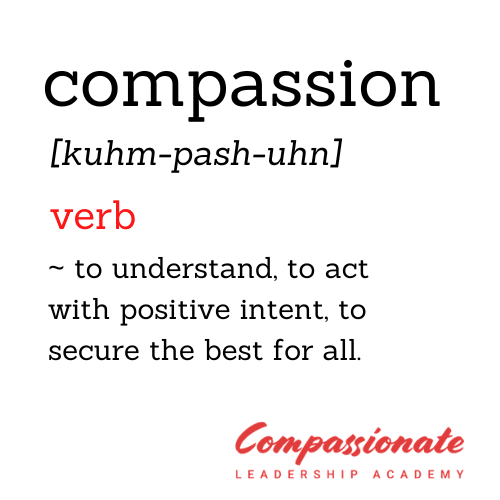So much has been written about the meaning of the word Compassion that seems to contradict and confuse, or, even worse, put people off practicing it. It gets confused with empathy. Becomes a synonym with mindfulness. Some inextricably link it to trauma and distress. Apparently, like Bambi on ice, compassion demands us to be vulnerable. Others even suggest that compassion is to do with shame.
Checking the dictionaries seems to bring some sort of coherence around sympathy with the Oxford saying it is “the feeling or emotion, when a person is moved by the suffering or distress of another, and by the desire to relieve it; …”. The Cambridge “a strong feeling of sympathy and sadness for other people’s suffering or bad luck and a desire to help”
All are consistent on one thing; they say compassion is a noun; I disagree.
From these descriptions I can see where the link to trauma comes from and the confusion with sympathy and empathy, and I get excited by the part that describes “desire to relieve, to alleviate and to help”, but I’m still not convinced. Dictionary definitions are fine, but what does compassion mean in practice?
So let’s refer to a higher source, indeed, a person who I believe is the highest earthly source and is known, globally, to be the embodiment of compassion and the genesis of wisdom on compassion, His Holiness the Dalai Lama.
I would argue that if anyone knows what compassion is all about, then the Dalai Lama is your man. He lives, breathes, talks, teaches and practices compassion. It is deep within his DNA and at the centre of all his thoughts and actions. He has written much on the topic, but two of his quotes stand out for me;
“If empathy is to understand another, then compassion is to work with that knowledge with positive intent”.
“Compassion is love”
Love. How often do we relate love to work? Not very often I’d say. But what the Dalai Lama means by love is the positive intent of your actions based on the needs of the other. It’s knowing the other and then putting them first you would do anything for someone you love and they for you too.
But if this talk of love is all too much for you then let’s focus on the first quote which we can paraphrase to “understanding with positive action”. Brilliant. Powerful. Energising. Change making and totally positive.
This is the point I want to make. You can be compassionate without trauma. You can be compassionate without vulnerability. Compassion is not sympathy, it’s not feeling sorry for someone, and it’s not all mindfulness, though that does help. Compassion is in the every day in every act. It is in helping others, helping someone across the road, picking up someone else’s litter.
Compassion is in extending your peripheral vision to “see” the needs of others and then to act with positive intent – from the heart.
Compassion is to be kind, but it is also to be firm.
Compassion is not soft; to always do the right thing by another will sometimes lead to tough conversations and tough decisions.
Compassion is in confronting negative intent.
Compassion is in not tolerating intolerance.
Compassion is more than just speaking up when things are not right, it is in then acting to put them right.
Compassion demands that first you strive to understand, to remove judgement and suspend your own perspective.
Compassion is a verb.
